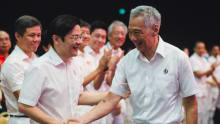Redefining employee experience in the year 2022

The COVID-19 pandemic has changed just about everything — from the way we live, to our method of conducting businesses. In today’s world, remote work and online interactions have now become the new normal. In return, this has brought a myriad of changes in the workplaces, including talent management, retention and density which will have a significant impact on the way we plan our strategies for HR transformation in the year 2022. Talent will play a critical role on all fronts which is why more than ever before, the terrain of employee experience must be redefined and levelled up to meet employee expectations and wellbeing.
Talent management
Over the last several decades, digital transformation has allowed organizations to completely reimagine the way talents are managed. And yet, it took an unprecedented event such as the pandemic to truly accelerate this trend and reimagine the way employees work, significantly changing how we manage day-to-day jobs.
Clearly, businesses cannot operate as they have been in the past and the significance behind business digitalization is clear – it improves efficiency, competitiveness, and helps companies achieve economies of scale. Therefore, it is remarkable to witness how the pandemic has played an integral role in accelerating digital adoption by many traditional businesses.
With the earlier Movement Control Order (MCO) which led to the new norm of working-from-home (WFH), companies have shifted a bulk of their traditional paperwork-based functions and pivoted towards digital technologies in order to streamline operations and automate manual processes. These processes include automating employment records, creating HR and training-related dashboards, analyzing employees’ skills and gaps, as well as identifying the right tools or modules to fill in or enhance the identified gaps. By successfully maneuvering the shift, this has resulted in greater productivity, reduced man-hours, and optimized employees’ skill set.
Talent Retention
A focus on continued learning is a great way to help employees stay competitive in their industry. As an effort to remain nimble, present workforce are continuously adding new skills to ensure they are ready to cope with any changes. This is all the more reason that it is in the employer’s best interest to support this demand for lifelong learning, upskilling, and reskilling, particularly as a strategy to retain talents post the pandemic.
One of our core values that should be ingrained among leaders is to encourage personal development. Essentially, this means our drive in unleashing the potential of each and every one of our employees. The objective for this value is not just to enhance the training function for the organization, but also to be known in the industry as an employer of choice that inculcates life-long learning for all its employees.
With that objective in mind, one critical strategy is to build a framework that not only recognizes the gaps, but also builds on from those gaps and creates a positive impact on our talents. Such framework for instance, includes leveraging business analytics tools which enables the creation of data-driven culture across the entire Group. This is something that has been proven to be of major importance, especially with all the operational shifts caused by the pandemic over the past year.
Talent Density
Simply put, the talent density of an organization is the ratio of its exceptional talent in relation to its satisfactory talent. The higher the talent density of an organization, the more likely that the organization would turn out to be a great place to work, one that constantly produces outstanding products and services.
It is now increasingly difficult for companies to hire and retain great talents to achieve high talent density. However, like all other things, this is not impossible and it takes a combination of sound hiring, management and retention strategies to achieve this. Two of our core values – (1) Just be flexible, and (2) Lead by example; are ingrained in the way HABIB Group employees work and to promote talent density. For example, we continuously foster reskilling and reshaping of relevant skillset for our employees, for instance, by partnering junior employees with those of more experienced, so the latter can serve as role models for the former. And the results of this approach have been extraordinary – our showroom employees, in particular, have demonstrated solid product knowledge and exceptional customer experience through mentoring of standardized practices, in-store processes, and up-to-date product knowledge.
In the process, our employees became more appreciative of the learning process, which in turn led to them being more involved as stakeholders in their own learning experience, with the drive to learn and contribute more. Producing great talents is equally important as attracting them. Acknowledging this, the Group recently updated our yearly performance appraisal framework to include Individual Development Plan to empower all our employees to reach their short and long-term career goals.
In the coming year despite the several challenges that remain, many businesses alike have the opportunity to start anew and redesign their organizational culture and teams to fit the new workforce landscape. At the end of the day, the effectiveness of their strategies could bring a significant impact not just towards employee experience, but also towards the overall employer branding.














